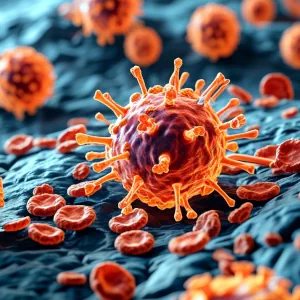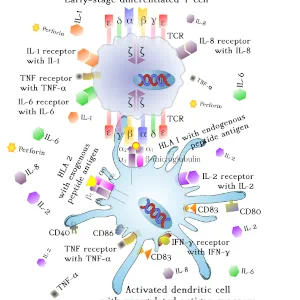CAPRI Immunotherapy: Pioneering Precision Medicine
Immunotherapy is revolutionising medicine, empowering the body’s immune system to combat tumors and autoimmune conditions with exceptional precision.
Cascade-Primed (CAPRI) cell therapy, an advanced form of adoptive cell therapy (ACT), targets malignancies, autoimmune disorders, and persistent infections, offering a low-risk, highly effective approach to complex health challenges. With over three decades of development, CAPRI’s robust scientific foundation and clinical potential mark it as a transformative therapy.


What Sets CAPRI Cell Therapy Apart
Unlike most adoptive cell therapies, CAPRI activates monocytes, key antigen-presenting cells, and leverages existing immunological memory to stimulate naïve T killer and helper lymphocytes. This enhances targeted cytotoxicity against cancer cells and pathogens like Helicobacter pylori or Chlamydia spp., which, like HPV in cervical cancer, have been associated with significant burden of disease [1, 2, 3].
In contrast to other adoptive cell therapies, CAPRI requires no tumor biopsies or genetic engineering and uses comparatively low cell doses to keep side effects minimal [4, 11].
The cell preparation process isolates peripheral blood mononuclear cells, stimulates them with anti-CD3 antibodies and IL-2, and primes T cells for highly specific, potent immune responses [4]. CAPRI cell therapy accounts for genetic variations in immune genes, and optimises the desired immune response by reestablishing the immune system's ability to distinguish between self and non-self [5, 6]

Are you a health professional and wish to know more about the immune events that define the science behind CAPRI? Feel free to watch our presentation that shows what happens in vitro, when the CAPRI method activates the patient's immune cells to fight autoimmune diseases, persistent infections and cancer.

A Legacy of Breakthroughs
Developed in the early 1990s by Rudolf Wank’s team at the University of Munich, Germany, CAPRI earned the 2006 Science Award from the German Society of Immunogenetics for its pioneering role in cancer immunotherapy.
Early trials in 1990 demonstrated success in treating recurrent miscarriages, revealing CAPRI’s broader potential [7]. Studies from 2002 to 2005 linked chronic Chlamydia spp. infections to schizophrenia, expanding CAPRI’s applications to neurological disorders [8].
Clinical reports from 2012 to 2013 showed markedly prolonged survival in stage IIIB/IV non–small-cell lung cancer (NSCLC) patients, with one surviving over 120 months, and neurological improvements in a coma patient [9, 10]. A 2014 study confirmed CAPRI’s efficacy against breast cancer, resulting in significantly enhancing survival (53.16 ± 1.91 months, when combined with conventional treatments (30.54 ± 0.49 months) [4, 11]. A 2020 observational study in China further validated CAPRI’s benefits in NSCLC, demonstrating greatly improved survival of 48 months with CAPRI versus 31.6 months without [12].

Clinical Applications
CAPRI has shown remarkable efficacy across diverse conditions:
- Cancer: NSCLC patients achieved remission, with no viable tumor cells post-surgery [11].
- Autoimmune Diseases: Reduced inflammation in rheumatoid arthritis and ankylosing spondylitis, likely by clearing bacterial debris [7].
- Neurological Disorders: Improved symptoms in multiple sclerosis, schizophrenia, and Alzheimer’s, linked to infections like Bartonella [1, 10].

Advancing Global Access
In collaboration with the scientific team in Munich, Consulting4Change is dedicated to making CAPRI accessible in resource-challenged environments, where effective yet affordable treatments are critically needed [1].
Since 2020, efforts to advance CAPRI’s manual production process have focused on scalability, with transitions to a semi-automated, fully GMP-compliant platform while supporting basic research with leading universities to refine CAPRI’s mechanisms, solidifying its role in precision medicine.

Join the CAPRI Revolution
At Consulting4Change, we are committed to advancing CAPRI therapy, offering hope and personalised care to patients worldwide. Contact us to explore CAPRI’s potential, learn about investment and research opportunities, and connect with our team multidisciplinary experts.
Here is a unique opportunity to build a legacy of health and prosperity for future generations and make a meaningful investment with lasting social and financial returns, while taking pride in shaping the future of accessible biotech.
References
1. Fellerhoff B, Laumbacher B, Wank R. High risk of schizophrenia and other mental disorders associated with chlamydial infections: hypothesis to combine drug treatment and adoptive immunotherapy. Med Hypotheses. 2005;65(2):243‑252. doi:10.1016/J.MEHY.2005.03.013
2. Fellerhoff B, Laumbacher B, Mueller N, Gu S, Wank R. Association between Chlamydophila infections, schizophrenia and risk of HLA-A10. Mol Psychiatry. 2007;12(3):264-272. doi:10.1038/sj.mp.4001925
3. zur Hausen H. HPV and cervical cancer. Presented at: Nobel Prize Lecture; 07 December 2008; Stockholm, Sweden. Accessed 30 June 2025. Available from: https://www.nobelprize.org/uploads/2018/06/hausen_lecture.pdf
4. Wank R, Song X, Gu S, Laumbacher B. Benefits of a continuous therapy for cancer patients with a novel adoptive cell therapy by cascade priming (CAPRI). Immunotherapy. 2014;6(3):269-282. doi:10.2217/imt.14.6
5. Fellerhoff B, Gu S, Laumbacher B, Nerlich AG, Weiss EH, Glas J, Kopp R, Johnson JP, Wank R. The LMP7‑K allele of the immunoproteasome exhibits reduced transcript stability and predicts high risk of colon cancer.
Cancer Res. 2011 Dec 1;71(23):7145–7154. doi:10.1158/0008-5472.CAN-10-1883
6. Wank R, Laumbacher B, Fellerhoff B. A new look at chronic Chlamydia infections and the role of MHC/HLA in diseases of the CNS. Future Neurol. 2013;8(1):55-66. doi:10.2217/fnl.12.70
7. Wank R. In vitro Fertilisierung und habituelle Fehlgeburt: immunologische Aspekte und Diskussion eines neuen Therapieansatzes mit stimulierten Lymphozyten. In: Fiedler K, ed. Moderne Aspekte der Sterilitäts- und Pränatalmedizin: Kongressband Dr. Krüsmann 1990. München; 1990:91–97. Accessed 30 June 2025. Available from: https://d-nb.info/1252630859/04
8. Fellerhoff B, Laumbacher B, Mueller N, Gu S, Wank R. Increased prevalence of Chlamydophila DNA in post-mortem brain frontal cortex from patients with schizophrenia. Schizophr Res. 2011;129(2-3):191-195. doi:10.1016/j.schres.2011.04.015
9. Laumbacher B, Gu S, Wank R. Prolongation of life by adoptive cell therapy with cascade primed immune cells in four patients with non-small cell lung cancer stages IIIB and IV and a Pancoast tumor. J Med Case Rep. 2013;7:266. doi:10.1186/1752-1947-7-266
10. Fellerhoff B, Laumbacher B, Wank R. Responsiveness of a patient in a persistent vegetative state after a coma to weekly injections of autologous activated immune cells: a case report. J Med Case Rep. 2012;6:6. doi:10.1186/1752-1947-6-6
11. Laumbacher B, Gu S, Wank R. Activated monocytes prime naïve T cells against autologous cancer: vigorous cancer destruction in vitro and in vivo. Scand J Immunol. 2012;75(3):314-328. doi:10.1111/j.1365-3083.2011.02652.x
12. Li H, Zhang Z, Duan X, Maimela NR, Yang S, Zhao X, Huang J, Zhang Y. Efficacy of cascade-primed cell infusion as an adjuvant immunotherapy with concurrent chemotherapy for patients with non–small-cell lung cancer: a retrospective observational study with a 5-year follow-up. Cytotherapy. 2020;22(1):35-43. doi:10.1016/j.jcyt.2019.12.002



